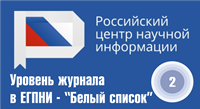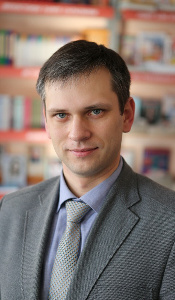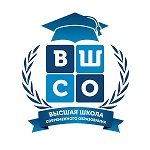ПРИМЕНЕНИЕ ВЗАИМООПРОСА НА ЗАНЯТИЯХ ПО ИНОСТРАННОМУ ЯЗЫКУ В ВУЗЕ
Аннотация
Обоснование. На занятиях по иностранному языку в вузах существует проблема недостаточности времени на контроль устного усвоения студентами профессиональных терминов. Применение методического приема взаимоопроса может способствовать более эффективному и быстрому контролю усвоения лексики.
Цель – раскрыть и доказать эффективность авторской практики применения взаимоопроса на занятиях по иностранному языку в вузах.
Материалы и методы. Применялся метод изучения, теоретического анализа и обобщения научной литературы и документов. Использовались методы научного наблюдения, обработки и сравнения полученных количественных результатов, эксперимент. Был произведен сбор, синтез и анализ количественных показателей, полученных в ходе эксперимента и анкетирования. Количественные данные, полученные методом вычисления среднеарифметических значений оценки по пятибалльной шкале, а также анкетирование использовались для подтверждения эффективности применения приема взаимоопроса на занятиях по иностранному языку в вузе.
Результаты. Активные методы и приемы обучения играют большую роль в повышении эффективности процесса обучения, улучшении психологического климата на занятиях, повышают мотивацию к изучению иностранного языка. Определено, что использование приема взаимоопроса на занятиях по иностранному языку в вузах сокращает время, отведенное на контроль знания лексического материала, и является более эффективным по сравнению с применением фронтального опроса. Согласно результатам анкетирования, методический прием взаимоопрос положительно принимается студентами и способствует созданию дружелюбной психологической атмосферы в группе, положительной мотивации к изучению иностранного языка, развитию навыков сотрудничества у студентов.
Скачивания
Литература
Список литературы
Букреева Т. А. Взаимопроверки как средство формирования самоконтроля учащихся // Современная образовательная среда: теория и практика: материалы IV Междунар. науч.-практ. конф. Чебоксары. Центр научного сотрудничества «Интерактив плюс», 2018. С. 57-59.
Давыдова Ю.Г. Формирование лингвопрагматической компетенции студентов вузов на практических занятиях по иностранному языку // Педагогика. Вопросы теории и практики. 2021. Т. 6, Вып. 1. C. 55-61.
Ермолаева Ж.Е. Взаимоконтроль: правила и применение на занятиях // EduNeo. URL: https://www.eduneo.ru/vzaimokontrol-pravila-i-primenenie-na-zanyatiyax/
Заровская В.А. Самоконтроль и взаимоконтроль в начальных классах // Молодой ученый. 2016. № 8 (112). С. 955-957.
Кобелева Е.П. Формирование профессиональной иноязычной компетенции будущих специалистов экономического профиля // Вестник Томского государственного педагогического университета. 2010. Вып. 12 (120). C. 56-59.
Курченкова Е.А., Кочеткова С.Ю. Особенности мотивации в изучении иностранного языка у студентов поколения Z неязыковых направлений подготовки обучения // Международный научно-исследовательский журнал. 2023. № 8(134). https://doi.org/10.23670/IRJ.2023.134.41
Линниченко С.И. Технологии интерактивного обучения английскому языку студентов технических вузов // Вестник Самарского государственного технического университета. Серия: Психолого-педагогические науки. 2023. Т. 20, №2. C. 61-74. https://doi.org/10.17673/vsgtu-pps.2023.2.5
Об утверждении и введении ФГОС 02.03.03 Математическое обеспечение и администрирование информационных систем. Приказ Минобрнауки России от 23.08.2017 N 809 (ред. от 08.02.2021). URL: https://fgos.ru/fgos/fgos-02-03-03-matematicheskoe-obespechenie-i- administrirovanie-informacionnyh-sistem-809
Поздеева С.И., Обсков А.В. Обоснование комплекса педагогических условий интерактивного обучения иностранному языку в техническом вузе // Научно-педагогическое обозрение. 2016. № 1 (11). C. 92-97.
Попкова Е.С. Роль взаимоконтроля в активизации познавательной деятельности учащихся // Певзнеровские чтения. 2015. № 1. С. 91-95.
Семина Л.В. Механизм обратной связи необходимая составляющая управления самостоятельной работы студентов // Народное образование. Педагогика. 2010. № 3. С. 29-30.
Стукалова А.С. Взаимоопрос как способ педагогического общения при дистанционном обучении студентов // Физико-химическая биология. Материалы IХ международной научной интернет-конференции. Ставрополь, 2021. C. 86-88.
Фошенко Н.Н. Практическое применение методов критического мышления на уроках истории, обществознания, как один из приемов современных педагогических технологий в условиях реализации ФГОС // Информационно-коммуникационные технологии в педагогическом образовании. Проблемы и перспективы современного физ.-математ. и цифрового образования. 2020. Вып. № 1(64). URL: http://infed.ru/articles/900/#:~:text=7
Шутова Г.В. Взаимоконтроль и взаимопроверка: правила и способы применения // Pedsovet. su. URL: https://pedsovet.su/metodika/5652_vzaimokontol_i_vzaimoproverka
Choi I., Land S. M., Turgeon A.J. Scaffolding Peer-questioning Strategies to Facilitate Metacognition During Online Small Group Discussion // Instructional Science. 2005. No. 33 (5). P. 483-511. https://doi.org/10.1007/s11251-005-1277-4
Kennewell S. Interactive teaching with interactive technology // World Coferance on Computers in Education. WCCE, 2005. URL: https://www.researchgate.net/publication/267953098_Interactive_teaching_with_interactive_technology
Tiffany G., Grieger K., Johnson K., Nyachwaya J. Characterizing students’ peer–peer questions: frequency, nature, responses and learning // Chem. Educ. Res. Pract. 2023. No 24, pp. 852-867. https://doi.org/10.1039/D2RP00146B
References
Bukreeva T. A. Mutual testing as a means of developing students’ self-control: conference proceedings. Sovremennaya obrazovatel'naya sreda: teoriya i praktika: materialy IV Mezhdunar. nauch.-prakt. konf. [Modern educational environment: theory and practice: materials of the IV Int. scientific-practical. conf. Cheboksary: Center for Scientific Cooperation “Interactive Plus”], 2018, pp. 57-59.
Davydova Yu.G. Forming Student’s Linguo-Pragmatic Competence in Foreign Language Classes. Pedagogika. Voprosy teorii i praktiki [Pedagogy. Theory and practice issues], 2021, vol. 6, is. 1, pp. 55-61.
Ermolaeva Zh. E. Mutual control: rules and application in classes. EduNeo. URL: https://www.eduneo.ru/vzaimokontrol-pravila-i-primenenie-na-zanyatiyax/
Zarovskaya V. A. Self-control and mutual control in elementary grades. Molodoj uchenyj [Young scientist], 2016, no. 8 (112). pp. 955-957. https://moluch.ru/archive/112/28594/
Kobeleva E.P. Development of Future Economists’ Professional Linguistic Competence. Vestnik Tomskogo gosudarstvennogo pedagogicheskogo universiteta [Bulletin of Tomsk State Pedagogical University], 2010, vol. 12 (120), pp. 56-59.
Kurchenkova E.A., Kochetkova S.Yu. Specifics of motivation in learning a foreign language among students of z generation of non-linguistic fields of study. Mezhdunarodnyj nauchno-issledovatel'skij zhurnal [International research journal], 2023, no. 8 (134). URL: https://research-journal.org/archive/8-134-2023-august/10.23670/IRJ.2023.13 4.41
Linnichenko S.I. Technologies of interactive English teaching at technical universities. Vestnik Samarskogo gosudarstvennogo tehnicheskogo universiteta. Serija: Psihologo-pedagogicheskie nauki [Bulletin of the Samara State Polytechnic University. Series of psychological and pedagogical sciences], 2023, vol. 20, no. 2, pp. 61-74. https://doi.org/10.17673/vsgtu-pps.2023.2.5
On approval and implementation of the federal state standard of higher education - bachelor's degree in the field of training 02.03.03 mathematical support and administration of information systems: order of the Ministry of Education and Science of Russia, 08.23.2017, no. 809 (amended on 02.08.2021). URL: https://fgos.ru/fgos/fgos-02-03-03-matematicheskoe-obespechenie-i-administr irovanie-informacionnyh-sistem-809
Pozdeeva S.I., Obskov A.V. Substantiation of the complex of pedagogical conditions for interactive teaching of a foreign language in a technical university. Nauchno-pedagogicheskoe obozrenie [Scientific and pedagogical education], 2016, no. 1(11), pр. 92-97.
Popkova E. S. The role of mutual control in activating the cognitive activity of students. Pevznerovskiye chteniya [Pevzner readings], 2015, no. 1, pp. 91-95.
Semina, L. V. Feedback mechanism is a necessary component of managing students’ independent work. Narodnoye obrazovaniye. Pedagogika. [Public education. Pedagogy], 2010, no. 3, pp. 29-30.
Stukalova A.S. Peer questioning as a way of pedagogical communication during distance learning of students. Fiziko-himicheskaja biologija. Materialy IV mezhdunarodnoj nauchnoj internet-konferencii. Stavropol'. [Physicochemical biology. Proceedings of the IX International Scientific Internet Conference]. Stavropol, 2021, pp.86-88.
Foshenko N.N. Practical application of critical thinking methods in history and social studies lessons, as one of the techniques of modern pedagogical technologies in the context of the implementation of the Federal State Educational Standard. Informacionno-kommunikacionnye tehnologii v pedagogicheskom obrazovanii. Problemy i perspektivy sovremennogo fiz.-matemat. i cifrovogo obrazovanija. [Information and communication technologies in pedagogical education. Problems and prospects of modern physical, mathematical and digital education], 2020, vol. 1 (64), part 1. http://infed.ru/articles/900/#:~:text=7
Shutova G.V. Mutual control and mutual verification: rules and methods of application. URL: https://pedsovet.su/metodika/5652_vzaimokontol_i_vzaimoproverka
Choi I., Land S. M., Turgeon A.J. Scaffolding Peer-questioning Strategies to Facilitate Metacognition During Online Small Group Discussion. Instructional Science, 2005, no. 33 (5), pp. 483-511. https://doi.org/10.1007/s11251-005-1277-4
Kennewell S. Interactive teaching with interactive technology. World Coferance on Computers in Education. WCCE, 2005, pp. 177-188. URL: https://www.researchgate.net/publication/267953098_Interactive_teaching_with_interactive_technology
Tiffany G., Grieger K., Johnson K., Nyachwaya J. Characterizing students’ peer–peer questions: frequency, nature, responses and learning. Chem. Educ. Res. Pract., 2023, no 24, p. 852-867. https://doi.org/10.1039/D2RP00146B
Просмотров аннотации: 182
Copyright (c) 2024 Elena A. Kurchenkova

Это произведение доступно по лицензии Creative Commons «Attribution-NonCommercial-NoDerivatives» («Атрибуция — Некоммерческое использование — Без производных произведений») 4.0 Всемирная.





































